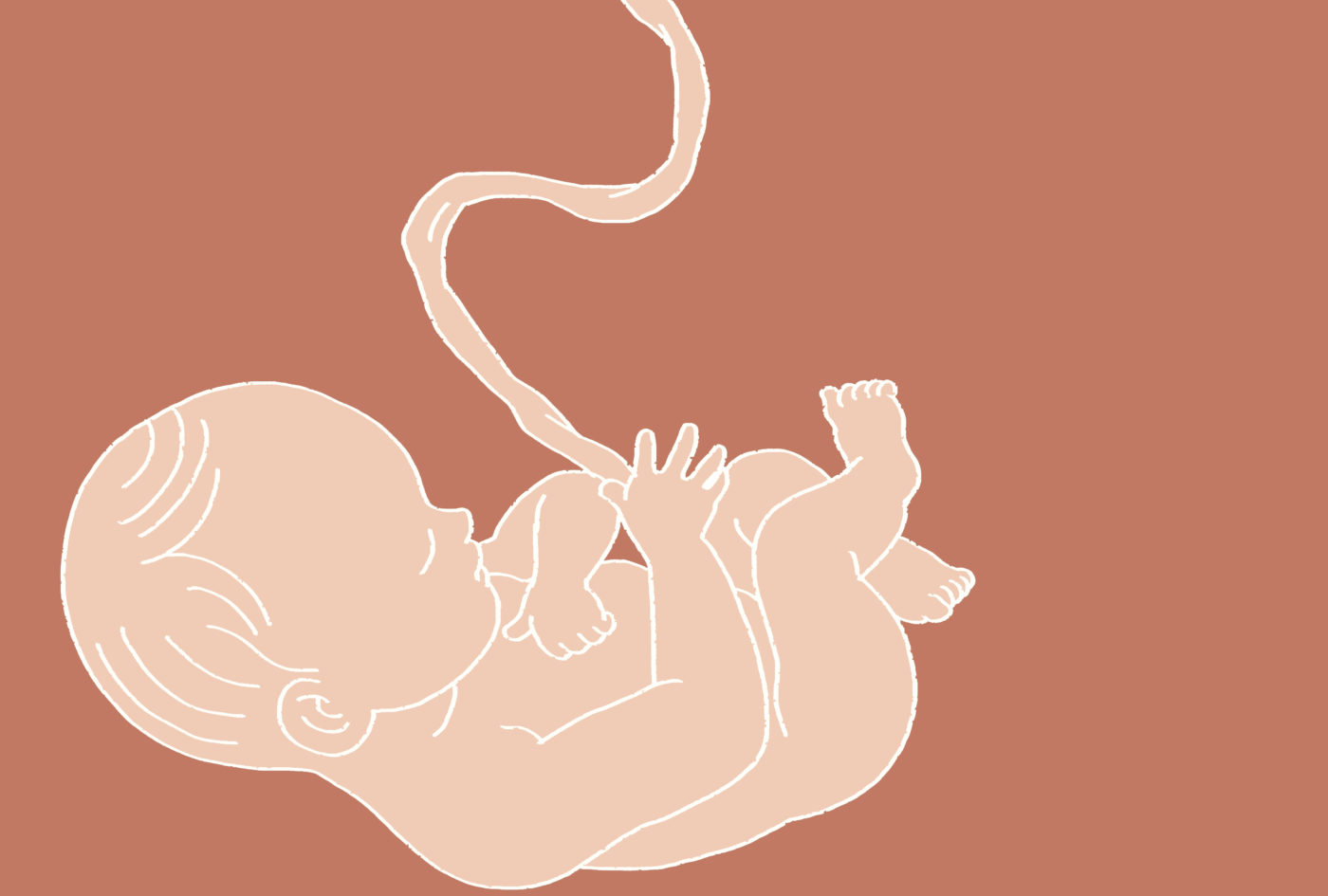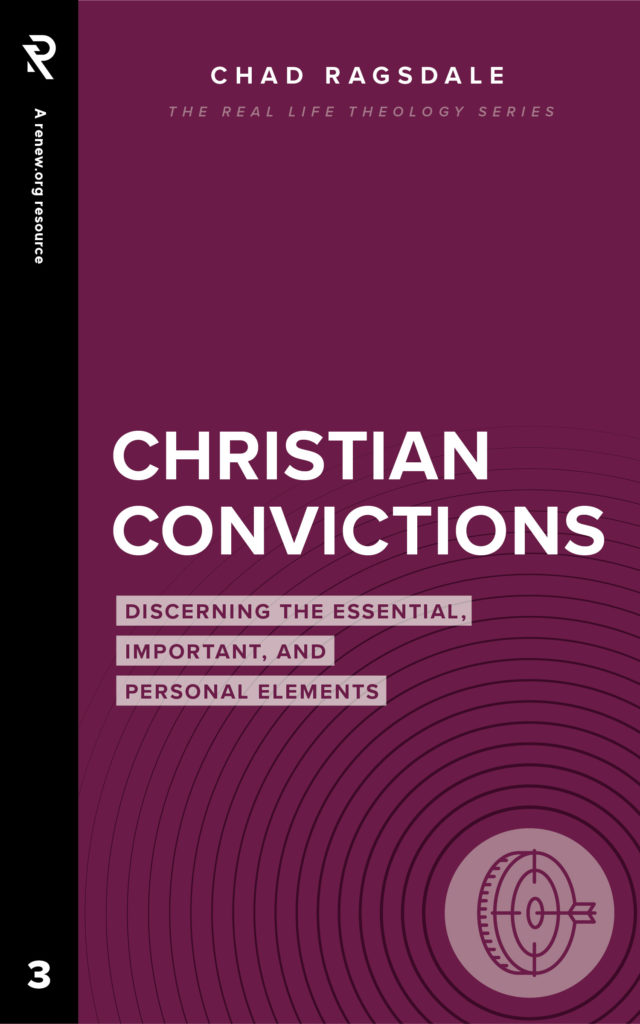
Why Not Abortion? An Answer to My Teenage Daughter
Yesterday, I was on the road coming back from two weeks at a summer conference for high school students when I got a call from my daughter. She was full of questions and anxiety. Like the rest of us, she had just heard about the SCOTUS ruling overturning Roe. She had already seen students expressing strong (negative) feelings about the ruling online. Fearing some potentially awkward or angry conversations, she didn’t know what she should (or shouldn’t say). After talking through some tips on how to navigate hard conversations, she asked me a question I wasn’t really anticipating. She wanted me to explain to her why abortion was wrong.
My daughter is extremely smart (if I don’t say so myself). She took an AP Government class this spring which really challenged her to think more deeply and accurately about politics. As a result of that, she already knew what the SCOTUS ruling meant in a legal sense. She already knew that abortion had not been banned. She already knew that it wasn’t the Court’s job to make laws. Anyone with a basic understanding of civics knows that’s the legislative task (just don’t ask anyone on social media what the actual job of the legislature is).
She wasn’t asking about politics. She was asking why, as a Christian, abortion is wrong. Coincidentally, I had answered that same question the day before from a girl at the conference who was my daughter’s age. To my embarrassment, I had addressed the issue for someone else’s daughter while assuming my own child already knew the answer.
I haven’t really written a ton on abortion. My most explicit post on abortion was from two years ago where I argued that abortion is one of the purest examples of systemic racism in America. If black lives truly matter, then the abortion industry must be examined. I realize that especially in light of this SCOTUS ruling and its aftermath, I shouldn’t really take anything for granted. We shouldn’t just assume that people in our churches or in our homes really understand the theological case against abortion. So what follows is an answer to my teenage daughter. I post it here in the hopes that perhaps it will help others as well.
“We shouldn’t just assume that people in our churches or in our homes really understand the theological case against abortion.”
The Bible is Silent
A common argument made in favor of abortion is that it is permissible because Jesus is silent on the issue. In fact, you won’t find the word abortion anywhere in the whole Bible. On the one hand, I’m glad when people signal that they want to base their ethical decisions on the authority of the Bible. But I can’t help but be a little cynical[1] when people only seem to appeal to the Bible when they are seeking permission to do what they already want to do anyway. In other words, I can’t help but wonder how the people who make this argument would respond if there was an explicit teaching against abortion in Scripture. Would they respond with obedience, or would they respond with some sort of “that was then, this is now” justification? I have my suspicions.[2]
There are several reasons why this argument from silence is not satisfactory. First, there are all sorts of things that the Bible and Jesus in particular is silent about. For instance, Jesus never expressed his opinion on drop kicking puppies for fun. So, should we assume that this would be acceptable to Jesus, or should we instead look for deeper, implicit principles in Scripture (and common moral sense) that would tell us that booting dogs is a bad idea? In the case of kicking puppies and abortion, there are implicit principles in Scripture that would lead to the conclusion that these are bad things. More on that later.
“In the case of kicking puppies and abortion, there are implicit principles in Scripture that would lead to the conclusion that these are bad things.”
Second, it’s not totally accurate to say that the Bible is silent on the topic. Psalm 139:13-14 says, “For you created my inmost being; you knit me together in my mother’s womb. Praise you because I am fearfully and wonderfully made; your works are wonderful, I know that full well.” And Jeremiah 1:5 says, “Before I formed you in the womb I knew you, before you were born I set you apart; I appointed you as a prophet to the nations.” Even accounting for the poetic nature of each text, these verses would express a very strange sentiment if life in the womb wasn’t a serious consideration. We also note the story of John the Baptist who, while still in his mother’s womb, recognizes the voice of Mary and leaps for joy (Luke 1:41). Again, this would be a very strange thing to say unless there was some assumption that life (and even identity) was present in the womb.
Third, Christians were opposed to the practice of abortion from the very beginning. Abortion and “exposure” were common among Roman citizens. There was very little stigma attached to the practice. In Roman culture it was rare to have more than two children and having more than one daughter in a household was extremely unusual. Gender-selective infanticide (similar to the practice of gender-selective abortion common in places like China today) was the norm. In such a society, Christians dared to be different. They condemned both abortion and infanticide and became known by their unusually large families with multiple daughters.
“In such a society, Christians dared to be different.”
As early as AD 70, Christians were condemning abortion in writing.
“The second commandment of the teaching: You shall not murder. You shall not commit adultery. You shall not seduce boys. You shall not commit fornication. You shall not steal. You shall not practice magic. You shall not use potions. You shall not procure [an] abortion, nor destroy a newborn child.”
Didache 2:1-2
Other early Christian writings also explicitly condemn both abortion and infanticide. The point is that being “pro-life” is by no means a new thing for followers of Jesus. If anything is new, it is the person who claims to be both a Christian and pro-abortion. Such a person would have been unheard of for most of the history of the church.
My Body, My Choice
The most compelling argument for abortion is the argument from bodily autonomy. It shouldn’t be anyone else’s business what I do with my own body, especially the government’s. In principle, I agree with the argument from bodily autonomy. In fact, this was one of my arguments against mandatory COVID vaccination especially after it was learned that the COVID vaccine wasn’t really stopping the transmission of the disease.
There are two arguments against bodily autonomy that we should consider though. First, bodily autonomy is not absolute. We have all sorts of laws dictating what you can and cannot do with your body. It is illegal to inject heroine into your body. It is unlawful to get a tattoo until you are 18 (or, if you are my daughter, until I am dead). In most places, it is unlawful to expose yourself in public. The government may also suspend your bodily autonomy by putting you into prison for the violation of a law.
Of course, many laws limiting bodily autonomy are put into place because of the potential harm that you might do to others. So, you can’t drive a car while drunk because you may hurt not only yourself but someone else. This was the argument used by some for mandatory vaccinations. The point is that bodily autonomy is not absolute. So the “my body, my choice” argument doesn’t quite say enough—especially if it is the case that the choice you make with your body harms another person.
This is the second problem with the my body, my choice argument. It is a biological fact that an unborn child is genetically distinct from her mother. While she may rely on her mother for life, she is not simply a clump of cells like a cyst or a tumor. If there is something other than a mother’s body involved in the act of abortion, the my body, my choice argument fails. Because the choice affects other people, we would never accept the argument that a person may drive drunk because of bodily autonomy. Neither should we accept the argument that an abortion is merely about a mother’s body.
“If there is something other than a mother’s body involved in the act of abortion, the my body, my choice argument fails.”
When Does Life Personhood Begin?
At the heart of the abortion debate is the question of personhood. It is not really a matter of when life begins. Pretty much everyone agrees that biological life begins at the moment of conception. Any other position is scientifically ignorant. The real issue is when a life becomes a person. When do we become persons? I use the word we because everyone reading this is a person. Every person reading this was also at one time in the womb of his or her mother. So when did we become persons? This is less a biological than a philosophical question.
There are a lot of suggestions that have been made. Some suggest that personhood is granted by society. So, a being becomes a person whenever society decides it is a person. Hopefully I don’t have to tell you how catastrophic this position has been. This was the justification used by both slaveholders and Nazis for their abuse of those classes of people they arbitrarily decided were non-persons. One of the world’s most prominent moral philosophers, Peter Singer, believes that personhood begins at something called sentience. Sentience is tough to define, but it basically means the conscious experience of pleasure or pain. This means that to Singer humans are not the only persons. In fact, a pig is more of a person than a newborn human child because a pig possesses greater sentience. Singer uses this definition of personhood to justify radical animal rights and also parents’ rights to practice infanticide if they have a child born with significant disabilities.
“Singer uses this definition of personhood to justify radical animal rights and also parents’ rights to practice infanticide.”
In the abortion debate, personhood matters a great deal. What everyone generally agrees on is that we shouldn’t kill innocent persons. A Christian justifies this by observing that all human persons are created in the image of God. Therefore, all people—no matter their race, ethnicity, gender, age, or physical ability—have intrinsic value and dignity which comes from God. This personhood is not decided or granted by societies or governments. It is innate to us as humans. It is less clear how committed secularists ground the dignity of personhood. Without God, it is hard to argue that there is any consistent foundation for human rights.[3] Nevertheless, this is a place where secular people and religious people agree. It is okay to kill an ant because an ant isn’t a person. It is not okay to kill an innocent human being because human beings are persons.
So, returning to the question. If personhood is what dictates whether or not it is acceptable to end a life, when does personhood begin? Does it begin at the moment of birth? Well, that would then justify abortion all the way up to moments before birth. Very few people—including those who are in favor of abortion—are willing to go that far. Intuitively most of us know that terminating a life late in pregnancy is wrong which is why most laws prohibit late-term abortions. The problem is that if an unborn child is apparently a person a week before birth, are they also a person a month before birth? Two months? Three months? When does personhood actually begin? It seems that we are forced to draw an arbitrary line saying “personhood begins at this point” when really we have no justification—scientific or ethical—for doing so.
Typically, pro-choice people have drawn the line at something called “viability.” The moment a child is viable outside of a mother’s womb, it is a person. This was an argument made in Roe vs. Wade. But this is a horrible argument. First of all, viability is not some firmly drawn date. Every child is viable at a different point in pregnancy. Further, because of medical technology, the date of viability has been moving further and further back into the pregnancy.
Secondly, it’s hard to know an arbitrary thing like viability can be used as a foundation to determine a child’s personhood. Are we to conclude that anyone living on life support is not a person? Is it simply a matter of being able to breathe on your own that makes you a person? That seems like a really shaky foundation which is why many pro-choice advocates have abandoned viability and now tend to speak only about a mother’s right to choose. The personhood of the unborn child doesn’t matter. The mother’s rights trump the child’s rights. I suppose when you abandon the foundation of the inherent dignity of persons this is what happens. All that matters is power and personal will. I am justified in using my power in ways that fit my needs at the moment.
“The personhood of the unborn child doesn’t matter. The mother’s rights trump the child’s rights.”
For all of these reasons, Christians have tended to say that personhood begins at the same moment that life begins. Now people are quick to make arguments like, “So you really believe that a life that is two days old in the womb of a woman is equal in personhood to a five year old child?” My response is simply this. Unless we associate personhood with the moment that human life begins, we are forced to arbitrarily draw lines granting some people personhood and denying it to others. The safest and most responsible place to draw the line is at the moment that life begins.
What is the Good Life?
There are a lot of different reasons why women choose to get an abortion. For the vast majority of women, an abortion is a decision born out of fear and tragedy. I think it’s good for those of us on the other side of this issue to keep that in mind.
There are three victims of every abortion, the unborn child, but also the mom and the dad. A child’s life is taken in the process. But a mother’s and father’s life is also taken in a way. Women lose the opportunity to be a mother. Men lose the opportunity to be a father. Such a loss leaves many women and men living with a considerable amount of pain and guilt following an abortion. They should be treated with care, compassion, and grace. I’ve heard several people say in the past few days that Christians shouldn’t just want a ban on abortion; we should work to make abortion unwanted. We do that with love and support and advocacy especially for those struggling with the fears of an unplanned pregnancy.
“Christians shouldn’t just want a ban on abortion; we should work to make abortion unwanted.”
One of the narratives from the pro-abortion industry is that the ultimate purpose of life is to live first and foremost for yourself. Material comfort and convenience are primary concerns. Modern society has made it possible to be the masters of our own destiny, and nothing may be allowed to get in the way of our own self-fulfillment, including a child. These arguments are very loud among those who are the strongest advocates for abortion. “How can women succeed in life if they are burdened by pregnancy?”
The implication is that succeeding in life—especially for a woman—involves denying motherhood and instead making money that we can then spend on ourselves. Children should only be allowed into your life when it is materially convenient for you. If we don’t have enough money to pursue our own dreams, we definitely shouldn’t allow a child to set us further back. This Washington Post article basically makes this argument, but embarrassingly, they actually prove the opposite point. They actually show that parenthood is an incomparable good. It’s hard to look into the face of a newborn child and say, “You’ve made my life hard. I wish you hadn’t been born.”
We know that parenthood is hard. It is trying. It demands sacrifices. It is full of anxiety—especially if you weren’t expecting to become a parent. But parenthood is also a gift. It builds virtue. It trains us to think of others before ourselves. It humbles us. It brings tears and also great joy. Parenthood makes us feel alive, more alive that most anything we can spend money on.
“Parenthood is hard…demands sacrifices…full of anxiety….Parenthood is also a gift. It builds virtue. It trains us to think of others before ourselves.”
Some people will read this paragraph and will say, “Well, that’s easy for you to say. You live in privilege.” I can’t really argue with that. I recognize it is hard for me to really appreciate the anxiety of a 17 year old girl from a poor community who is suddenly pregnant. I would respond in two ways. First, it is kind of gross for privileged people to argue that certain classes of people should really be discouraged from having children. It is condescending and bigoted. This was precisely Margaret Sanger’s argument when she founded Planned Parenthood. Certain classes of people (especially ethnic minorities) needed to be discouraged from having too many children.
My second response is that Christians—especially those who are privileged with wealth and stability—need to continue to step up and share with those who are in need. Don’t be satisfied with the end of abortion. We should work to create a culture of life and flourishing by supporting those who are at most risk and are targets for the easy answers of the abortion industry.
[1] Ok, you know me well enough to know that I’m rarely a little cynical about anything.
[2] The issue of homosexual sex provides a good indicator of what their response might be. In this case, there is unambiguous teaching in Scripture, but nevertheless, creative approaches are deployed to explain these teachings away.
[3] Some argue that being anti-abortion is an inherently religious position. We shouldn’t prohibit abortion because it is the equivalent of enforcing our faith on others who don’t share our beliefs. I have a couple of responses. First, it is absurd to believe that all people except religious people are free to advocate their deeply held beliefs in the public square. That’s simply anti-religious bigotry. Second, on issues of life and death, it is especially insulting that anyone would say “keep your beliefs to yourself.” Third, I think that secular people are not completely wrong when they identify this as a religious position. Frankly, the belief in the sanctity of persons is a deeply held religious position. It isn’t clear to me how a person who has rejected the existence of God can argue that something called “human rights” even exist. But that’s another post for another day.
(From chadragsdale.wordpress.com. Used with permission.)








